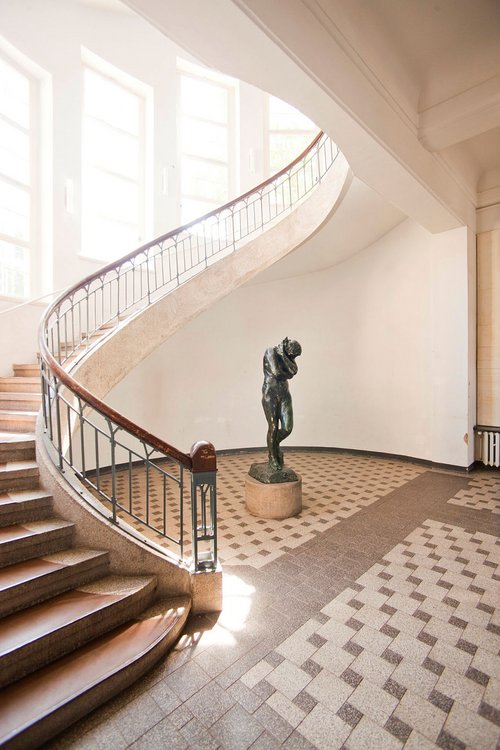
»An essential part of students’ lives and the University’s history« – donor couple ensure that Rodin’s »Eva« will be restored
After a vandal knocked Rodin’s world-famous »Eva« off her pedestal in the entrance hall of the main building on 7 February 2016, the bronze statue underwent extensive examination by experts. However, until now the funding for its restoration had not yet been secured. The public appeal for funds has now been answered by married couple Thomas and Birgit Rabe, whose donation has ensured that the artwork will return to the centre of university life at the Bauhaus-Universität Weimar.
Rodin’s world-famous »Eva« has decorated the halls of the Bauhaus-Universität Weimar since December 1912. As soon as it was installed, the bronze statue found a home at the heart of the University in the main building’s entrance hall. However, its central, freely accessible location in the centre of the Henry van de Velde foyer became its downfall on 7 February 2016 when it was knocked from its pedestal by a vandal. The sculpture suffered substantial damage and has been undergoing extensive examination by experts ever since.
Since the accident, the restoration work has been supported by a University fundraising campaign. Many friends and donors have already supported this project, under the slogan »Eva belongs to us«, but until now the full funding required for the restoration had not been secured.
The public appeal for funds has now been answered by a married couple whose donation has ensured that »Eva« can be fully restored. A private donation from Thomas Rabe and his wife Birgit Rabe will allow the artwork to return to the centre of University life at the Bauhaus-Universität Weimar. The sculpture should be back in its rightful place for the Bauhaus centenary year in 2019.
We talked to the donor couple about their relationship with art (in particular Bauhaus and the artist Rodin) and their reasons for supporting the fundraising campaign.
How did you become aware of our Eva, her absence and the fundraising campaign?
On a sunny Saturday in March of this year, we were in Weimar following in the footsteps of Schiller, Goethe and Bauhaus. We began with the Bauhaus Museum, looked into Schiller’s and Goethe’s houses, and then late in the afternoon we came back to Bauhaus – at the Bauhaus-Universität. In the stairwell of the main building, we saw an appeal to fund the restoration and restore Eva to her rightful place. We were immediately won over, so we contacted the University that evening.
What prompted you to support the Bauhaus-Universität and the campaign?
We won over by the role that Eva plays for students and the University, the dedication of the members of staff we spoke to, and the currently empty space in the stairwell. It quickly became clear to us that Eva needed to be back in her rightful place. We are also personally interested in Bauhaus, as well as Henry van de Velde and his impact in Weimar. Just under two years ago we purchased the Nouvelle Maison in Brussels, a house owned by Henry van de Velde, and are currently restoring it.
You are connoisseurs of Henry van de Velde and his work. What makes the University’s main building (where Eva lives) so special?
The special nature of the main building has been described much more skilfully than we ever could by numerous architectural guides. The building is where Bauhaus was founded. It impresses with its aesthetic clarity, and above all the lively dynamic of the stairwell. It was planned by self-educated Henry van de Velde.
Without your donation Eva could never have been restored so quickly. How would you generally describe your commitment as art enthusiasts and supporters?
We are interested in and collect art. We support art, for example via donations to museums. Eva is an important work by Rodin. However, what is even more important is the fact that Eva is an essential part of students’ lives and the University’s history. We hope that our donation will allow it to return more quickly, and by the 100th anniversary of Bauhaus at the very latest.
The interview was conducted by Jessica Krecisz, student assistant in the president’s office.
